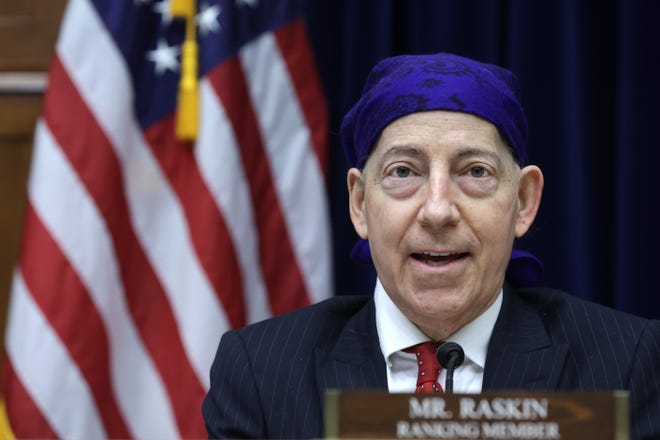
Smart business or “woke capitalism“?
Democrats and Republicans squared off over environmental, social and governance investing again Wednesday, this time during a House Oversight Committee hearing.
House Oversight Committee ranking member Rep. Jamie Raskin (D-Md.) blasted dark money interests for carrying water for the fossil fuels industry and said anti-ESG attacks are punishing businesses for doing their fiduciary duty by preparing for climate change.
“The whole point of being a fiduciary is to be vigilant, watchful and alert to opportunities and risks,” Rep. Jamie Raskin of Maryland, the top Democrat on the Oversight Committee, said during the hearing. “And that’s what asset managers, corporate board members and executives do with other people’s money.”
Illinois Treasurer Michael Frerichs, also a Democrat, agreed. “This pushback is anti-free market and anti-investor,” he testified.

‘Unelected cabal of global elites’
Republicans fired back. Asset managers should only consider financial returns when making investment decisions and stop engaging in “woke capitalism” that endangers the retirement savings of American workers, they countered.
“An unelected cabal of global elites is using ESG to hijack our capitalist system, capture corporations and threaten the hard-earned dollars of American workers,” Alabama Attorney General Steven Marshall testified before the committee.
Marshall was one of 17 Republican attorneys general who filed a motion Wednesday to block BlackRock from imposing ESG policies on utility companies.
What is ESG?
ESG is an investing strategy that takes into account environmental, social and corporate governance factors in addition to financial analysis.
It is popular with major pension funds that invest the retirements of millions of workers as well as retail investors.
Why ESG investing is under fire
ESG is seen as a threat to the oil, gas and coal industries amid a nationwide push away from fossil fuels. Corporate environmental efforts often include reducing carbon footprints and divesting from fossil fuels.
Why Republicans oppose ESG
Red states from Texas to West Virginia have launched investigations and pulled billions from money managers like BlackRock despite concerns that doing so may hurt financially.
Running point in the anti-ESG movement is Florida Gov. Ron DeSantis, who may soon announce his bid for the 2024 GOP presidential nomination.
Last week, DeSantis signed a bill, the Government and Corporate Activism Act, banning state agencies and local governments from considering ESG factors when investing money.
In Texas, Republicans are expanding their anti-ESG efforts to target insurance companies. Legislative proposals include a bill that would restrict insurance companies from using ESG considerations when setting rates.
Anti-ESG backlash: How businesses are fighting back
ESG advocates argue that climate change and boardroom diversity are financial issues that should be considered alongside more traditional financial analysis because they signal investments that are riskier than they may appear.
Business interests are fighting back, saying climate and other risks are business risks.
From North Dakota to Mississippi, state lawmakers have defeated proposals that would bar state governments or pension funds from doing business with financial institutions that follow ESG principles.
“We’re starting to see a backlash in the states to measures that would restrict investors from taking into account long-term business risk in their portfolios,” Republican strategist Ron Bonjean recently told USA TODAY. “There is a clear business and financial case to these measures’ failures: The free market depends on investment decisions that take material risks into account.”






